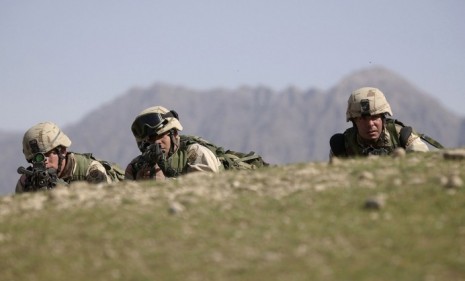Did a U.S. 'kill team' go rogue in Afghanistan?
American soldiers allegedly murdered Afghan civilians and collected body parts as trophies, claim military documents

A free daily email with the biggest news stories of the day – and the best features from TheWeek.com
You are now subscribed
Your newsletter sign-up was successful
At least 12 American soldiers formed a secret "kill team" in Afghanistan that murdered Afghan civilians for fun and collected body parts as war trophies, according to charge sheets released by the U.S. military. Here's a guide to the grisly investigation:
How many soldiers are involved, and where are they from?
A total of 12 soldiers have had criminal charges leveled against them. All are from the 5th Stryker Brigade, 2nd Infantry Division, which is based at Joint Base Lewis-McChord in Washington state. Only five have been accused of murder, but the rest are alleged to have carried out a host of other violent crimes.
The Week
Escape your echo chamber. Get the facts behind the news, plus analysis from multiple perspectives.

Sign up for The Week's Free Newsletters
From our morning news briefing to a weekly Good News Newsletter, get the best of The Week delivered directly to your inbox.
From our morning news briefing to a weekly Good News Newsletter, get the best of The Week delivered directly to your inbox.
What are the allegations?
The dozen soldiers have been charged with a total of 76 crimes, including the murders of three Afghan civilans, and the beating of at least one of their fellow soldiers. Six have been accused of taking body parts from Afghan corpses as "trophies," including a skull and fingers. Other charges include assault, drug abuse, stealing mortars for personal use, and attempting to impede the investigation. (Read a full list of charges here)
Who was leading this 'kill team'?
The most senior ranking defendant is Staff Sgt. Calvin Gibbs, a 25-year-old soldier from Billings, Montana. Gibbs allegedly joked to other members of his platoon in December 2009 about tossing a grenade at civilians. The first civilian supposedly murdered by the 'kill team' died in a grenade attack. Al Jazeera reports that "finger bones, leg bones and a tooth" from Afghan corpses were found in his possession. Gibbs denies all 16 charges leveled at him.
A free daily email with the biggest news stories of the day – and the best features from TheWeek.com
When and where did these crimes take place?
They are alleged to have happened earlier this year, while the 5th Stryker Brigade was stationed at Forward Operating Base Ramrod, west of Kandahar. The region is one of the most dangerous in Afghanistan.
How did they come to light?
The investigation was launched after a soldier from the 5th Stryker Brigade informed his superiors that some of the accused were smoking marijuana. The informant was allegedly attacked and threatened with death as a result. Staff Sgt Gibbs reportedly showed the fingers collected from Afghan corpses to the whistle-blower to stop him talking.
What do the soldiers say about the charges?
All deny the charges leveled against them. One, Spc. Jeremy Morlock, reportedly admitted involvement in the first murder but later claimed his statements were made under the influence of prescription drugs. The father of one of the other accused, Spc. Adam Winfield, says his son had told him of the first murder and expressed his horror at it. Subsequent attempts by Christopher Winfield to warn the U.S. Army about his son's platoon's behavior were reportedly ignored. Spc Winfield is one of the five accused of murder.
What are the alleged motives?
"The charge sheets don't shed light on what might have driven the soldiers to kill," says Mike Archbold at McClatchy, "whether for revenge, or for sport, or something else." The 5th Stryker Brigade suffered a heavy toll in Kandahar, losing 32 soldiers since July 2009 — including seven in a single roadside bomb.
What happens next?
The charges are being considered by a military grand jury to determine if there is enough evidence for a court-martial. More details will likely emerge about the charges then, as the prosecution lays out its case to officers.
Sources: McClatchy (2), Seattle Times, Associated Press, AOL News, Christian Science Monitor, The Guardian, Al Jazeera
-
 Switzerland could vote to cap its population
Switzerland could vote to cap its populationUnder the Radar Swiss People’s Party proposes referendum on radical anti-immigration measure to limit residents to 10 million
-
 Political cartoons for February 15
Political cartoons for February 15Cartoons Sunday's political cartoons include political ventriloquism, Europe in the middle, and more
-
 The broken water companies failing England and Wales
The broken water companies failing England and WalesExplainer With rising bills, deteriorating river health and a lack of investment, regulators face an uphill battle to stabilise the industry